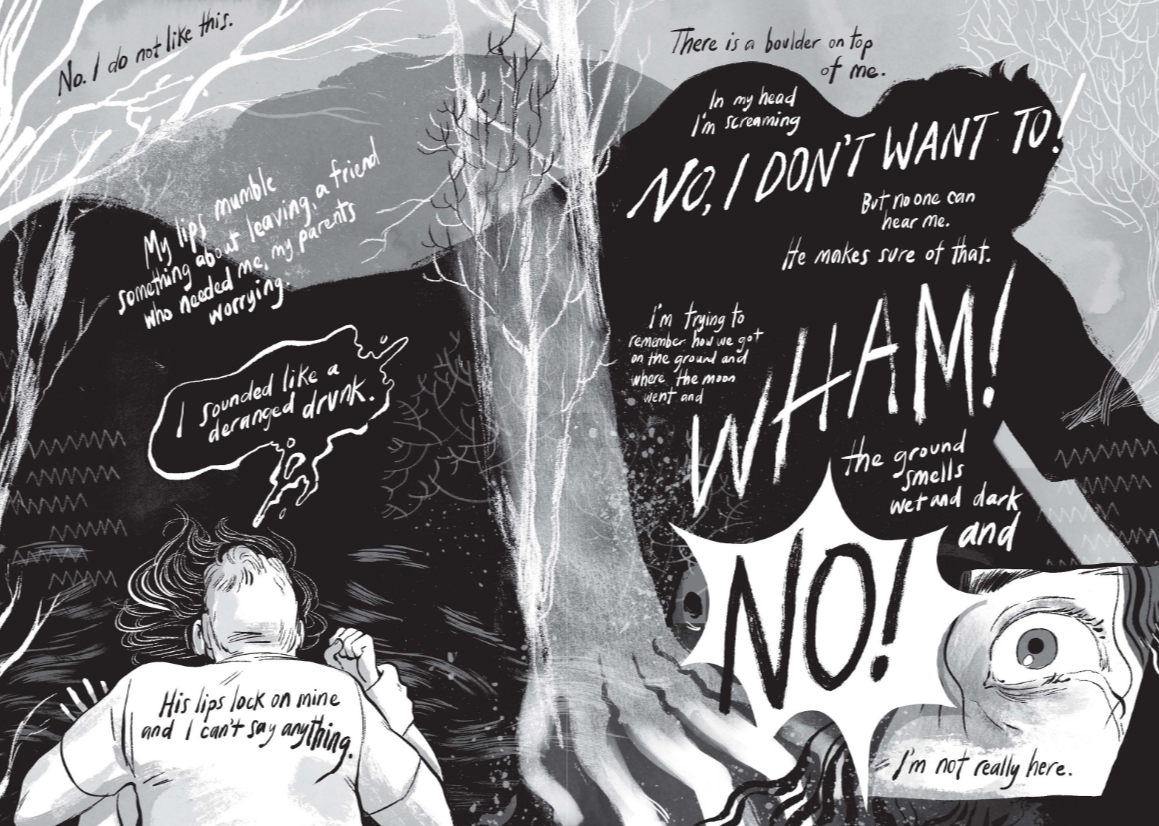Melinda Fights Back
By Jennifer Smith
Every
once in a while, a book comes along that feels like it has been written just
for us. Its message has a power that resonates even after we have finished
reading the words. Speak by Laurie Halse Anderson is one of those books that
just stays with you, a powerful and thought-provoking book that explores the
reality of sexual assault and its aftermath. The novel is written from the
perspective of Melinda, a high school freshman who has been traumatized by a
sexual assault at a party. It is this event that silences her voice and
isolates her from her peers. Through her eyes, we see the impact of the assault
on her mental health, relationships, and academic performance. Anderson's
writing is raw and honest, capturing the complexity of Melinda's emotions as
she struggles to find her voice and come to terms with what has happened to
her. The book is a poignant reminder of the importance of speaking out against
sexual violence and the need for greater awareness and support for survivors.
It is a must-read for anyone seeking to understand the devastating effects of
sexual assault and the power of speaking up. In the book there are various
factors made it difficult to speak about her assault. However, there are also
various factors that become essential to her healing and to finally finding her
voice.
One
of the factors that made it hard for Melinda to speak was the lack of support
and understanding from her family and friends. Her parents are distant and busy
with their own problems, and they rarely communicate with Melinda or show interest
in her life. They often criticize her for her grades, appearance, and attitude,
but they never ask her how she feels or what she needs. Her former friends also
abandoned her after she called the police at the party, without knowing the
reason why she did it. They spread rumors about her and call her names, such as
"Squealer" and "Freak". They also ignore or mock her when
she tries to reach out to them or warn them about Andy. Melinda feels alone and
betrayed by the people who should have cared for her, and she thinks that no
one would believe her or help her if she told them the truth. Melinda is afraid
of the consequences of speaking out.
Another
factor that made it difficult for Melinda to speak was the shame and guilt that
she felt about her rape. Melinda feels ashamed of what happened to her. This
shame is evident in the following quote: "I am outcast" (Anderson 4). She blames herself for what happened, and she
thinks that she deserved it because she was drunk, naive, or weak. She also
fears that people would judge her or blame her for being raped. She fears that
no one will believe her, that she will be blamed for what happened, or that she
will be ostracized by her peers. This fear is evident in the following quote
from the book: "I want to confess everything, hand over the guilt and
mistake and anger to someone else...but I can't" (Anderson 13). According
to t Judith Herman, the “conflict between the will to deny horrible events and
the will to the
will to proclaim them aloud is the central dialectic of psychological trauma
(McGhee 174-175). Rather than speaking out about her assault, Melinda
internalizes the negative messages that society sends to rape survivors, such
as "It's your fault", "You asked for it", or "You
should have fought back". She also suffers from post-traumatic stress
disorder (PTSD), which causes her to have nightmares, flashbacks, and panic
attacks whenever she sees or hears something that reminds her of her rape. She
tries to cope by avoiding anything that triggers her memories, such as mirrors,
closets, parties, or Andy himself. She also cuts herself with a paperclip or
bites her lips until they bleed, as a way of expressing or numbing her pain.
She feels trapped in her own body and mind, and she thinks that speaking would
only make things worse.
However,
despite these obstacles, Melinda eventually finds some factors that help her
heal and find her voice. One of these factors is art. Melinda has a passion for
drawing and painting, and she finds an outlet for her emotions in her art
class. Her teacher, Mr. Freeman, encourages her to express herself through a
year-long project on a tree. Melinda struggles at first to create a realistic
and meaningful representation of a tree, but she gradually improves as she
experiments with different styles and techniques. Mr. Freeman also supported
Melinda and praised her for her courage and talent. He told her, "You've
been through a lot, haven't you? ... You've created something very powerful,
very beautiful here" (Anderson 198). She uses her art as a way of
communicating, such as when she draws a mural of a tree on the wall of her
closet. The tree represents her growth and healing after being raped by Andy
Evans at a party. She starts with a dead tree, symbolizing her trauma and
silence, and gradually adds leaves and branches as she gains confidence and
courage. The mural is her way of expressing herself and reclaiming her voice. According
to Jessi Snider, “Art therapy is about the process and not the product. In a
therapeutic sense, if there is no emotion in a work, there is no point in
creating it” (308). Art helps Melinda reconnect with herself and with the world
around her, and it gives her a sense of purpose and identity.
Her burgeoning friendship with David Petrakis,
Melinda’s Lab partner, also helps her to find her voice David is one of the few
people who treats her with respect and kindness. His willingness to stand up to
Mr. Neck, the history teacher, shows Melinda that speaking up is important, no
matter the consequences.
In
conclusion, Melinda faces numerous obstacles in speaking out about her rape,
including fear, shame, and trauma. However, with the help of self-expression, supportive
people, and courage, she is able to find her voice and begin the healing
process. This novel is a testament to the resilience of survivors and the power
of speaking out.
Works
Cited
Anderson, Laurie Halse. Speak
/ 20th Anniversary Edition. Square Fish, Farrar Straus Giroux,
2019.
McGee, Chris. “Why
Won’t Melinda Just Talk about What Happened? Speak and the
Confessional
Voice. Children’s Literature Association Quarterly, vol. 34,
no. 2, 2009,
pp.
172-187. Project Muse, doi.org/10.1353/chq.).1909.
Snider, Jessi. “‘Be the
Tree’: Classical Literature, Art Therapy, and Transcending Trauma in
Speak.”
Children’s Literature in Education, vol. 45, no. 4, 2014, pp. 298–309,
https://doi.org/10.1007/s10583-014-9221-3.





Comments
Post a Comment